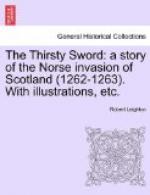So indeed it might have been. But in crossing with his five vessels over the stretch of sea between Colonsay and Tiree he encountered a strong gale from the southeast. The Gallwegians, being indifferent seamen, fell off to leeward and lost control of their galley. In the nighttime they were driven out into the Atlantic beyond Skerryvore. When the storm abated they drifted northward, landed on many islands in turn, playing great havoc amongst the children of the old vikings, and so disgracing their own country Scotland that the Norsemen of the Hebrides vowed vengeance upon all Scots wheresoever they might encounter them.
CHAPTER XX. ALONE WITH DEATH.
Kenric with his squadron, reduced now to four galleys, voyaged to the isle of Tiree — a distance of about fifty miles from Colonsay. There, without drawing arrow from sheath or sword from scabbard, he prevailed over the lord of that land to give him surety of his adherence to King Alexander, and a solemn declaration that he would remain true to his oaths. And then the barks departed for Coll.
Now young Harald of Islay having warned the people of Colonsay of the approach of the invaders, bade his men take him at once to the isle of Coll, whither, as it chanced, Earl Sweyn the Silent had gone, and there the lad told the same tale of how Kenric of Bute was bent upon making conquest of the isles, yet breathing no word of how King Alexander had ordered the expedition. The men of Coll, thus warned, would not brook that the ships of Bute should touch at their island, so ere Kenric had yet arrived at Tiree they got their many galleys together, and joining with the forces of Earl Sweyn they stood off behind the little isle of Gunna, ready to make an onslaught upon the squadron that Kenric was leading.
“It was night,” said Duncan, in telling his story to Allan Redmain — “It was night when we came abreast of the isle of Coll, and we anchored in the wide bay of Crossapol. When the day’s light fell upon the sea my lord Kenric came to me, and, said he, ’Duncan, launch me the longboat with a dozen men, and come with me, for I will now land upon this island and seek for the king’s castle.’ So thereupon we landed.
“Not long had we been ashore when from the top of a little hill we saw, above the next bay, the castle that men call Breacacha. And going down to it, we were near to its gates when behold there came out a full two score of armed men, and they fell upon us with swords and spears. Fourteen men we were against forty, and we fought for two long hours, until of the men of Bute there were left but three alive, John Campbell of Glen More, my master, and myself. I was sorely wounded in the chest and like to fall down from the loss of blood. Of the men of Coll five remained. Twelve of their comrades my lord Kenric had slain with his mighty sword, and with little hurt to himself, saving only that his breath had grown weak.




